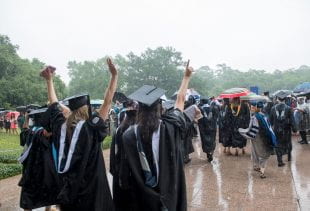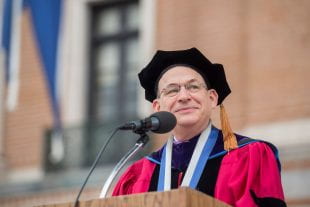Former Houston Mayor Annise Parker ’78 discussed the power of failure, what is required of leaders and what people need from each other as she spoke to graduates at Rice University’s 106th commencement May 11 in the Academic Quad.
“If nothing in your life scares you, if nothing in your life tests your limits or makes you question yourself, you aren’t doing enough, you aren’t pushing yourself enough, you aren’t challenging yourself,” Parker said. “You cannot make progress if you don’t move forward, if you don’t exceed your comfort zone and risk failure. Failure is an option — it has to be, if we’re to grow and learn.”
A native Houstonian, Parker graduated from Rice with a bachelor’s degree in anthropology, psychology and sociology. She served as Houston’s 61st mayor, elected three times, from 2010 to 2016 after spending six years as a City Council member and six more as city controller.
Her career spans the private sector, entrepreneurship, government and not-for-profit leadership. As the first openly gay mayor of a major U.S. city, she was named one of the 100 most influential people in the world by Time magazine in 2010 and was also was ranked No. 7 on the City Mayors Foundation’s 2014 list of the world’s top 10 mayors.
Following an introduction by President David Leebron, Parker told a story about a lesson she learned many years ago while preparing for a rally hosted by Houston’s Gay Political Caucus.
The rally was scheduled to take place in a city park following Houston’s annual pride parade, Parker said, and she needed help from an electrical worker to dim the lights before the fireworks show. When the worker found out she was gay, she recalled, he was less than friendly and almost refused to help her. But after a brief conversation and recognition of some of their shared beliefs, the city worker agreed to help her.
“I learned some lessons that day that I should have already learned,” Parker said. “You can’t be a leader just when it’s convenient, you cannot assume you know how someone will react and what someone thinks, and when you get knocked down you have to get up and keep trying. But the most important lesson is that if you’re willing to try, you can find a point of connection to anyone. But you have to be willing to try.”
Parker also told a story of mentoring Rice student leaders as part of her work with the Doerr Institute for New Leaders. Rice administrators had turned down a request from the students and they weren’t happy about it.
“We don’t like being told no,” she recalled the students telling her. “We’re used to success.”
Parker said that being accustomed to success is all well and good, “but it’s more important to know how to deal with failure.”
“It’s not because adversity builds character,” she said. “I don’t believe adversity builds character, I think adversity tests character. But leadership is a muscle that needs to be exercised. Leaders have to risk failure.”

A little rain didn’t dampen the spirits of the newly minted graduates as they made their ceremonial exit through the Sallyport. Photo by Tommy LaVergne.
Parker said the students have gained an “invaluable” asset with their newly earned Rice degrees and a world of opportunity surrounding them.
“Rice is committed to preparing leaders, both in your fields of study and as engaged citizens,” she said. “You are being called to leadership in a country that desperately needs it, and I know you’re ready for it.
“America has long been a messy amalgam of high ideals and base reality,” Parker continued. “We extol the benefits of diversity, and I know Rice talks about that a lot. But we extol the benefits of diversity while we voluntarily segregate ourselves by race, gender, religion, culture, class, language and politics.”
Parker cautioned students of the technological “echo chamber” that allows people to connect quickly to like-minded individuals while disregarding conflicting viewpoints.
“The more we find community in the electronic echo chamber, the less we engage with those who differ, disagree and disapprove,” she said. “The deeper we gaze into the infinity mirror, the further we are from the complex, complicated and contradictory living human beings around us.”
Parker encouraged students not to find their passion and follow it, but rather to find their service and use it to connect with others.
“Find your service, and give it your passion,” she said. “It is to be blessed to find that they are one and the same. It isn’t only in times of crisis that we need to come together as human beings. Serve your country, serve your community, serve your art, serve your faith, serve a cause, serve something that is greater than you are.”
Parker concluded by reminding students that every life matters, and “you only have one life.”
“In the end, what other lives will you have touched, what kindness will you share, what difference will you bridge?” she said.
She remarked that she is fond of the adage, “if it’s not worth doing, it’s not worth doing well.”
“But know that when you find that which is worth doing, it is worth doing with everything in you,” she said. “With your heart, with your soul, with your mind, with everything in you. Seek out that which is worth doing.”
Leebron presented the 2019 Annise Parker Impact through Public Service Award to Hanszen College graduates Navya Kumar and Sonia Torres. The award is presented to a graduating student or students whose work best exemplifies the values and ideals represented by the speaker. (Read more about the award here.)
Prior to the commencement address, Board of Trustees Chair Bobby Tudor ’82 and Leebron welcomed students, families and friends to the outdoor ceremony.
“We want you to know how welcome you are on our campus, now and every time into the future,” Leebron said. “We thank our families and parents of our graduates today for lending us these outstanding students and soon-to-be graduates who have contributed so richly to our community here at Rice.”
Ariana Engles, past president of the Student Association, and Jason Guo, past president of the Graduate Student Association, also addressed the graduates and shared insights from their time at Rice.
Rice conferred 2,028 degrees to 1,964 students, some of whom claimed double or triple majors, including 1,008 undergraduate and undergraduate professional degrees and 1,020 graduate degrees (master’s and doctoral).
Separate ceremonies, including an evening convocation with fireworks, were held May 10 to individually recognize the recipients of bachelor’s, master’s, doctoral and business degrees, and then all degrees were conferred during the plenary ceremony May 11.




